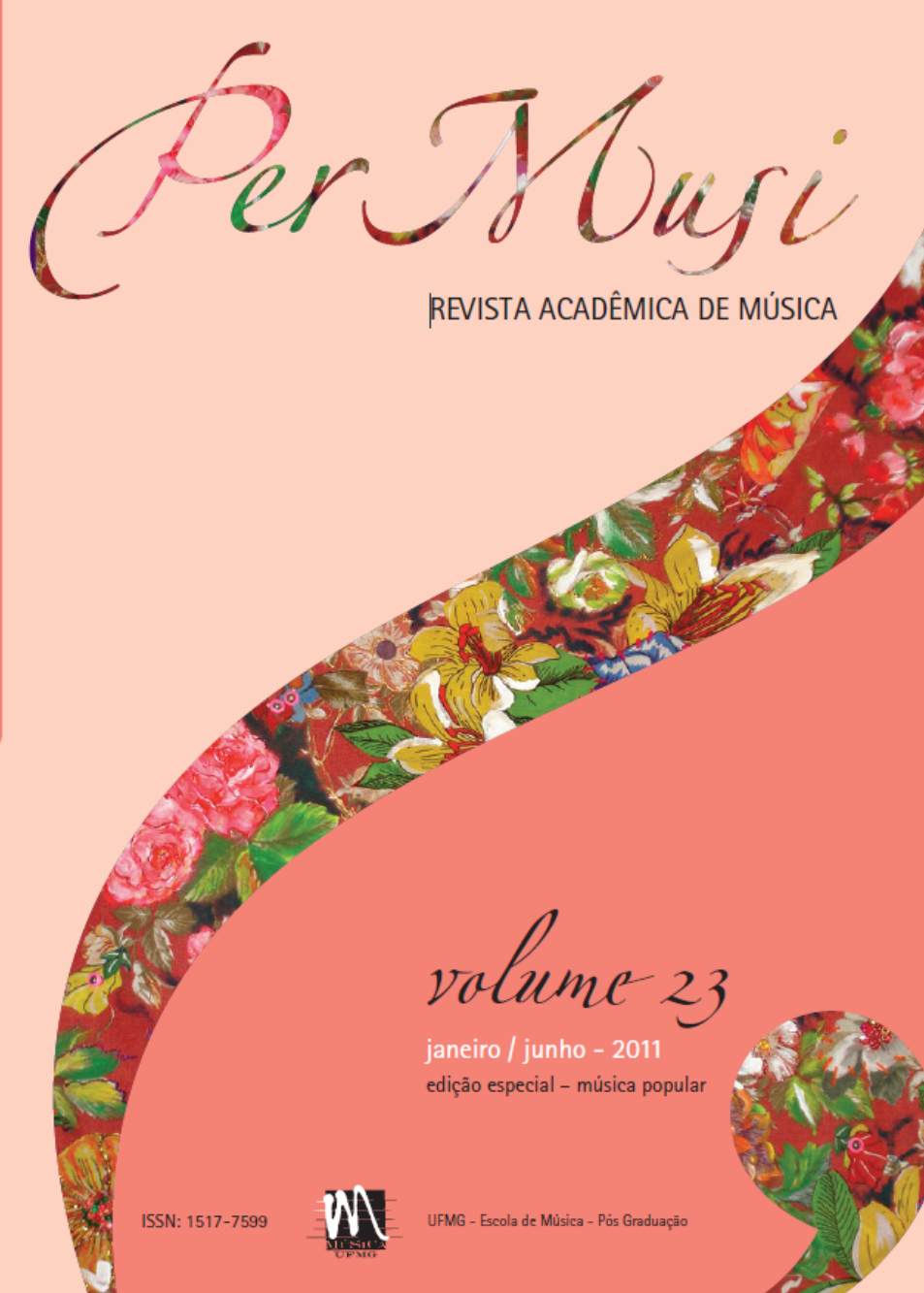Tiger Rag en la interpretación de Le Quintette du Hot Club de France
historia, análisis y prácticas de actuación
Palabras clave:
Django Reinhardt, Stephane Grappelli, Jazz na França, Le Quintette du Hot Club de FranceResumen
Estudio de la asimilación del jazz en la cultura popular francesa de los años 30 y de la creación de una sociedad de aficionados a este estilo, especialmente en torno a Le Quintette du Hot Club de France. La transcripción y el análisis de Tiger Rag, música de los miembros de la Original Dixieland Jazz Band (Nick La Rocca, Eddie Edwards, Tony Sbarbaro, Larry Shields y Harry da Costa) en la actuación de Le Quintette (LE QUINTETTE DU HOT CLUB DE FRANCE, 1934, remas 1993) revela sus prácticas de interpretación, especialmente de sus solistas: Django Reinhardt, a la guitarra, y Stephane Grappelli, violín.
Referencias
Referências de texto
ANTONIETTO, Alain. Djangology. Notas do CD.EMI France, v.1-11, 1990, p.12.
BORÉM, Fausto. O anticlímax da História do Soldado de Stravinsky: proporção, coerência harmônica e relação texto-música na sequência Pequeno Coral, Canção do Diabo e Grande Coral. Em Pauta. v.12. Porto Alegre: UFRGS, 2003. p.131-154.
CHERRET, Ted, ed. The Genius that was Django Reinhardt. London: privately printed, 2001, p. 58.
DELAUNAY, Charles. Delaunay’s Dilemma: De la Peinture au Jazz. Macon: Editions W, 1985, p.64.
GRAPPELLI, Stéphane avec Joseph Oldenhove, Jean Marc Bramy. Mon Violon pour tout Bagage: Mémoires. Paris: Calmann-Lévy, 1992, p. 56.
HENSHAW, Laurie. “Swing Guitars.” Melody Maker Agosto 1942, p. 4.
HOEFER, George. “The Magnificent Gypsy.” Down Beat 14 July 1966 : p. 21-24.
JORDAN, Matthew F. “Jazz Changes: A History of French Discourse on Jazz from Ragtime to Be-Bop.” Ph.D. Dissertation, Claremont Graduate School, 1998, p.281.
KENNEY, William Howland. “Le ‘Hot:’ the Assimilation of American Jazz in France, 1917-1940.” American Studies 25 (Spring 1984): p. 5-24.
KERNFELD, Barry, ed., The New Grove Dictionary of Jazz London: Macmillan Press, 1988, p.932, s.v. “Notation” by Robert Witmer.
MORGENSTEN, Dan. “Jazz Fiddle.” Downbeat 34 February, 1967, p.16-19.
SCHULLER, Gunther. Early Jazz. Oxford University Press: New York, 1968, p.34.
SMITH, Geoffrey. Stéphane Grappelli. London: Pavilion, 1987, p.61.
TIRRO, Frank. Jazz.: A History. W.W.Norton& Company: New York, 1993, p.19.
Referência sonora
LE QUINTETTE DU HOT CLUB DE FRANCE. Tiger Rag. In: Chronological Django Reinhardt: 1934-1935. Classics Records, França, remasterizado em 1993.
Referência de partitura
ORIGINAL DIXIELAND JAZZ BAND. Tiger Rag (1917) na performance do Le Quintette du Hot Club de France. Per Musi, Belo Horizonte, n.23, 2011, p.xxx-xxx.
Descargas
Publicado
Número
Sección
Licencia

Esta obra está bajo una licencia internacional Creative Commons Atribución 4.0.

Excepto cuando se indique lo contrario, el contenido de este sitio está sujeto a una Licencia Creative Commons - Atribuição 4.0 Internacional.












